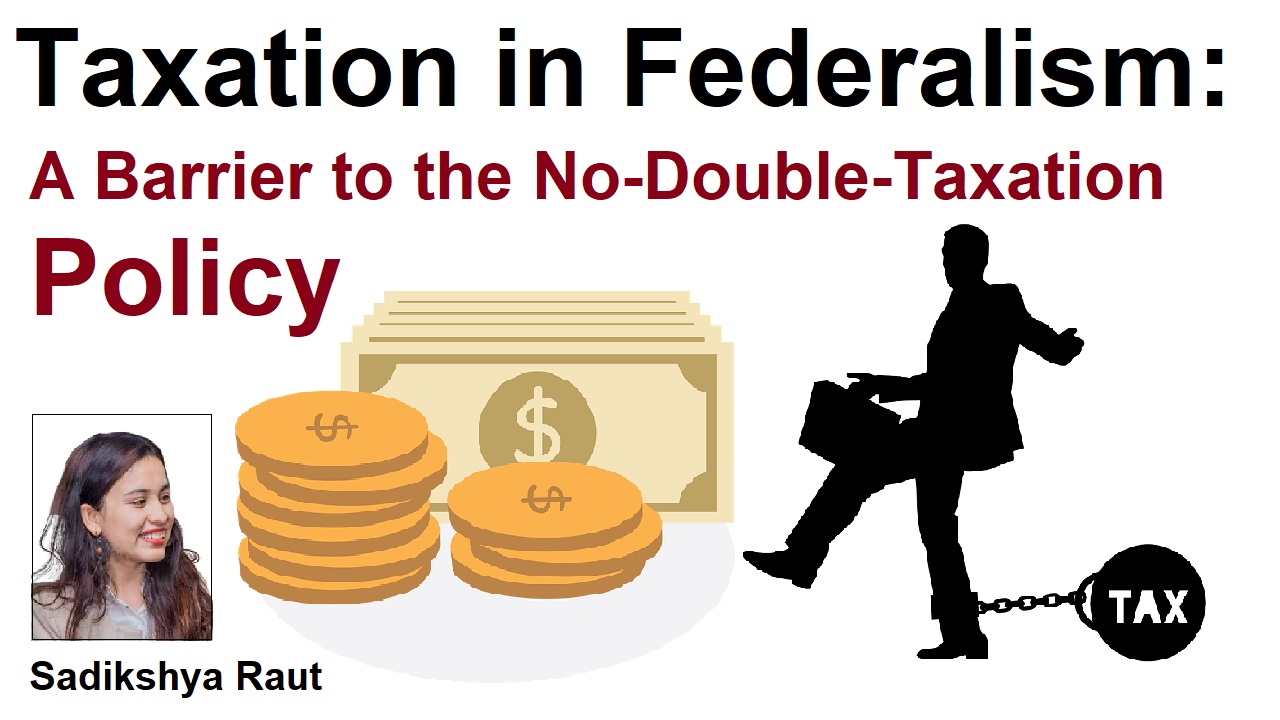![]() By Sadikshya Raut,
By Sadikshya Raut,
Section Officer at Patan High Court
Double Taxation—a notion that is principally wrong has created a threat of an unwanted burden to the taxpayers. Double taxation is a tax system, which refers to income taxes paid twice on the same source of income. It can happen when income is to be paid tax at both the corporate level and personal level. It also occurs in international investment or trade when similar income is taxed in two different countries.
Efforts have been made at the international level to avoid double taxation through treaties and commitments. However, the ambit of double taxation does not only transcend the border; the threat also exists internally, especially in a country with a federal model. But this risk has been shadowed by the huge image of international trade and cross-border taxation policy.
Although many countries have a federal model of governance, the issue related to tax jurisdiction in federal states remains unclear. Federalism provides self and shared power to multi-tier government and taxation power is pivotal. The adaptation of concurrent powers, on one hand, and the guarantee of autonomy to sub-national governments, on the other hand, has made taxation more ambiguous and debatable.
Taxation is a key ingredient to serve the national economy and fund budgetary commitments so that the citizens get to reap the benefits of public and government services to the fullest. Many people pay tax not by their free will but because of the legal compulsion imposed. Governments need to choose their tax bases carefully so that they are welcomed and complied with by the people. Inflicting tax multiple times on the same person, either legal or natural, for the same income or profit poses the burden of multiple taxations.
There is no universal model for fiscal federalism. It depends upon national interests and policy. Generally, the central government takes the responsibility of defining the tax base and collects a major portion of the tax. It then distributes or re-distributes them to subnational governments. The latter are mostly assigned the responsibility of service and local taxes such as land tax, house rent tax, entertainment tax, and many more. However, this is not universal. In Switzerland, higher degrees of tax autonomy is provided to cantons rather than central government. Cantons are free to choose their tax base unless expressly prohibited by the Federal Constitution.
Regardless of the differences in autonomy provided, every tier of government has equal sovereign power. The major challenge to effective fiscal federalism arises when the taxation authority for same income, property, and business intersects in the jurisdiction of two or more governments. The risk of such overlap also extends to a person or business domiciled differently from their place of residence or registration. The fusion of concurrent power on taxation and inter-jurisdictional competence often gives birth to double taxation by creating circumstances where-
- Single income, business, or property is taxed differently by different subnational governments (horizontal double taxation).
- Single income, business, or property is taxed differently by different tiers of government (Vertical Double Taxation)
For instance,
- The Constitution of Nepal has assigned the power to levy business taxes to the local level. A single business may manufacture a product in one local unit, distribute it in another, and may have a warehouse in a third local unit.
In such circumstances, a single business entity may have the tax burden on multiple local bodies for a single good transaction.
- The Constitution of Nepal has enlisted tourism fees as exclusive power of federation and local level. Thus, the tourism sector may have a dilemma about the payment of tax, i.e., whether to pay tax at the Federation or local level or both.
We often refer to double taxation as a wrongful act yet we witness the Constitution of many countries providing exclusive and concurrent taxation power to multi-tier governments, which leads to the possibility of double taxation. This shows double taxation is surely not favored but has been permissible. So it is very significant to comprehend the position of double taxation in the eye of law.
U.S. Supreme Court in Comptroller of Treasury of Maryland v. Wynne declared double taxation of income unconstitutional. In many federal countries, double taxation has not been explicitly prohibited by the constitution or laws. Hence, double taxation may or may not be illegal. Nevertheless, is it just or not? That has always been the concern. The decision ultimately rests with the adjudicating authority. But unfortunately, even the court lacks uniformity in this regard.
This vacuum or non-clarity of law, non-uniform judicial practice, and legislative negligence have posed a hindrance to fairness and economic justice of core policy. While taking a step forward to mitigate international double taxation, the government should not ignore the prevalence and impact of multiple taxations by multi-layered governments within its territory. The ailment of double taxation can be medicated.
Double taxation is neither an intended output of the legislative body nor a commended policy by taxpayers. It is high time that this tyranny is thrashed out through inter-state comity and by heeding to proper coordination amongst multi-tier governments to make an umbrella Act on Taxation, majorly focusing on the avoidance of double taxation.
 Nepali Law A complete legal information portal
Nepali Law A complete legal information portal




